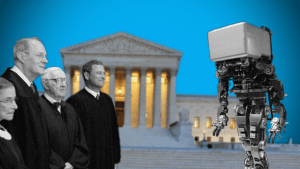Matt Field in the Bulletin of the Atomic Scientists:
 People who tweet in their jobs—let’s say 21st century journalists, just for example—might say that writing two million tweets represents a daunting challenge. That’s the rough number, Twitter says, that a Russian-linked set of accounts cranked out on the 2016 US presidential race in just the 10 weeks leading up to the election. Of course, in that case, the prolific “authors” were a collection of about 50,000 automated accounts often called bots. A new law in California will soon force bots that engage in electioneering or marketing to declare their non-human identity.
People who tweet in their jobs—let’s say 21st century journalists, just for example—might say that writing two million tweets represents a daunting challenge. That’s the rough number, Twitter says, that a Russian-linked set of accounts cranked out on the 2016 US presidential race in just the 10 weeks leading up to the election. Of course, in that case, the prolific “authors” were a collection of about 50,000 automated accounts often called bots. A new law in California will soon force bots that engage in electioneering or marketing to declare their non-human identity.
While the Kremlin agents who interfered in the US election likely wouldn’t be beholden to a state-level law in the United States, or deterred by it, domestic political campaigns and businesses might. For at least one constitutional scholar, that possibility raises this question: Do bots, like citizens, have that most sacred right enshrined in the First Amendment to the US Constitution, the right to free speech? Laurent Sacharoff, a law professor at the University of Arkansas, thinks the people programming bots may want US courts to answer that in the affirmative.
More here.
